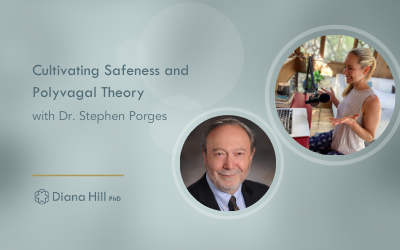Stress and anxiety levels are high right now due to the spread of the COVID-19 virus. In this episode, Dr. Stephen Porges offers us a model of our physiology of threat and strategies to boost feelings of safeness, especially with COVID-19 anxiety. Through the lens of Polyvagal theory, Dr. Porges and Diana explore what it means to be human in the face of infectious disease, trauma, and global uncertainty.
“To be able to be supportive to those who are around us if they’re feeling anxious or uncomfortable, we can’t just say to them, ‘forget it, it’s not important.’ Polyvagal Theory says our goal, our responsibility, is to support those around us so that they feel safer.”
Dr. Stephen Porges
About Dr. Stephen Porges
Stephen W. Porges, Ph.D. is a Distinguished University Scientist at Indiana University where he is the founding director of the Traumatic Stress Research Consortium. He is Professor of Psychiatry at the University of North Carolina, and Professor Emeritus at both the University of Illinois at Chicago and the University of Maryland. He served as president of the Society for Psychophysiological Research and the Federation of Associations in Behavioral & Brain Sciences and is a former recipient of a National Institute of Mental Health Research Scientist Development Award. He has published more than 300 peer-reviewed papers across several disciplines including anesthesiology, biomedical engineering, critical care medicine, ergonomics, exercise physiology, gerontology, neurology, neuroscience, obstetrics, pediatrics, psychiatry, psychology, psychometrics, space medicine, and substance abuse. In 1994 he proposed the Polyvagal Theory, a theory that links the evolution of the mammalian autonomic nervous system to social behavior and emphasizes the importance of the physiological state in the expression of behavioral problems and psychiatric disorders. The theory is leading to innovative treatments based on insights into the mechanisms mediating symptoms observed in several behavioral, psychiatric, and physical disorders. He is the author of The Polyvagal Theory: Neurophysiological foundations of Emotions, Attachment, Communication, and Self-regulation (Norton, 2011), The Pocket Guide to the Polyvagal Theory: The Transformative Power of Feeling Safe, (Norton, 2017) and co-editor of Clinical Applications of the Polyvagal Theory: The Emergence of Polyvagal-Informed Therapies (Norton, 2018). He is the creator of a music-based intervention, the Safe and Sound Protocol ™, which currently is used by more than 1400 therapists to improve spontaneous social engagement, to reduce hearing sensitivities, and to improve language processing, state regulation, and spontaneous social engagement.

+ show Comments
- Hide Comments
add a comment